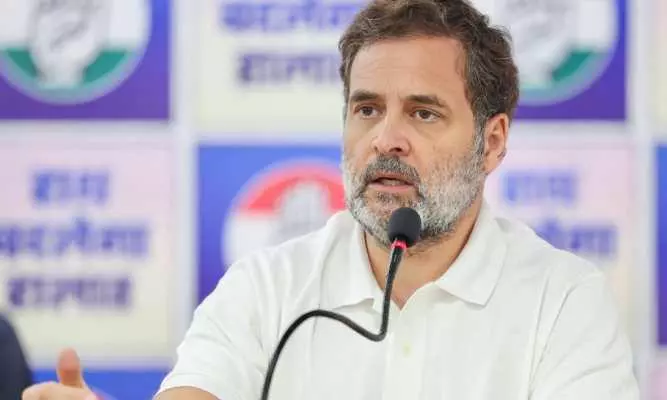
National Herald case: AICC tried to revive AJL, Rahul's lawyer tells court
text_fieldsNew Delhi: In the ongoing National Herald money laundering case, Leader of Opposition (LoP) in the Lok Sabha Rahul Gandhi told a special Delhi court on Saturday that the All India Congress Committee’s (AICC) efforts to revive the pre-Independence newspaper had been wrongly interpreted as an attempt to liquidate its assets.
Appearing before Special Judge Vishal Gogne, senior advocate R.S. Cheema, representing the LoP, criticised the Enforcement Directorate’s (ED) “squinted version” of events, which alleged that the AICC sought to profit from the sale of assets belonging to Associated Journals Limited (AJL), the company that owns the newspaper.
Cheema asserted that the AICC had no intention of selling AJL’s assets and was instead focused on reviving the historic media outlet associated with India’s freedom struggle.
LoP Rahul Gandhi’s lawyer also questioned why the ED had not presented before the court a Memorandum of Association (MoA) of AJL, which said that the policy of AJL will be the policy of the Congress.
Emphasising the non-commercial nature of the organisation, Cheema maintained that the newspaper had never operated as a profit-making entity.
The AICC just wanted to bring AJL back on the rails, he said.
ED has alleged that Sonia and Rahul Gandhi held a 76 per cent majority stake in the private company Young Indian, which it claims fraudulently acquired assets worth ₹2,000 crore belonging to the now-defunct Associated Journals Limited (AJL) for a nominal sum of ₹50 lakh. According to the ED, this transaction was part of a larger scheme to usurp AJL’s assets under the guise of a revival effort.
On Thursday, the ED concluded its oral arguments before the Rouse Avenue Court, urging the court to take cognisance of its prosecution complaint against Congress Parliamentary Party Chairperson Sonia Gandhi, Leader of Opposition Rahul Gandhi, and other accused, including Congress Overseas Chief Sam Pitroda and Suman Dubey. Additional Solicitor General S.V. Raju, representing the ED, argued that Young Indian Ltd was used as a vehicle to gain control of AJL’s assets and that the other accused were merely acting on behalf of the Gandhi family.
The following day, senior advocate Abhishek Manu Singhvi, appearing for Sonia Gandhi, described the ED’s case as “really strange” and “unprecedented”, questioning the basis of the money laundering allegations and asserting that no tangible assets had changed hands.
The controversy dates back to 2012, when BJP leader Subramanian Swamy filed a complaint alleging cheating and breach of trust in the acquisition of AJL. During its investigation, the ED concluded that Young Indian, allegedly under the beneficial ownership of the Gandhis, had taken control of AJL’s properties while significantly undervaluing their market worth.
In November 2023, the ED attached immovable properties worth ₹661 crore and AJL shares valued at ₹90.2 crore, categorising them as suspected proceeds of crime.






